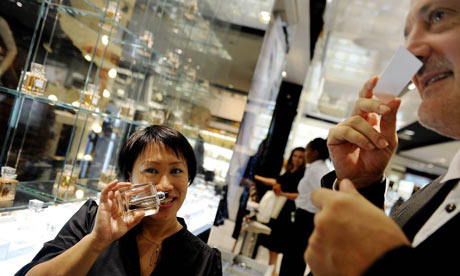
I touched on Perfumes: the Guide by Luca Turin and Tania Sanchez in today's G2 arts diary. What a wonderful book (I've just opened it and, in a synaesthesic overture, it's offering me Amouage Gold, a spray-sample of which I left between its leaves). It offers a critical analysis – smelling notes, if you will – of 1,500 perfumes. I suppose the authors' language and technique relates somewhat to wine criticism. But the art of writing about something so emotionally rich and elusive (and at the same time entirely unlockable by the proper technical expertise) reminded me a bit of how people write (or try to write) about music (a subject I'm speaking about at this year's Association of British Orchestras annual conference). As it happens, Turin and Sanchez often use musical metaphor to help explain the nature of a perfume (they talk in terms of "brassy" or "melodic line" or "string section"; Shalimar has a "uniquely sweet, penetrating tune"; Yatagan a "high-pitched, hissing tone"). What about a job swap between these two and Andrew Clements or Alexis Petridis, I wonder.
Over Christmas I did a lot of smelling in the various perfumery halls and perfumery shops of London, and had enormous fun trying to get to grips with the artform. The joy of it is that most perfumes are widely available and can be squirted by the curious with impunity. The scent I've been wearing for the past few years – Irisia by Creed – Turin and Sanchez write off, with a cutting one-star review, as a "green floral chypre of exceptional banality and unpleasantness", so I have have had the amusement of trying to find a replacement.
By the way, Sanchez notes the importance of the web in writing and sharing knowledge about perfume. She writes: "Until recently, talking intelligently about the art of perfume seemed impossible. Then suddenly it seemed inevitable. What changed? The obvious: the Internet. Online now you can read historical and technical information, find discontinued or otherwise elusive perfumes, order samples of raw materials to smell out of curiosity, and, most important, find communities of people clustered around this single obsession. Half of what I know I owe to the 24-hour-a-day pajama party that is the fragrance board of Makeup Alley... Online communities can criticise perfume in a way that magazines have never dared: there's no advertising to lose... Perfume blogs now seem to outnumber the sample vials around my desk: there are men and women of intelligence sitting down every day and thinking and writing about perfume."
It's a bit like the way Alex Ross talks about the way the web has affected his relationship with and access to contemporary music. It's that old long tail.

